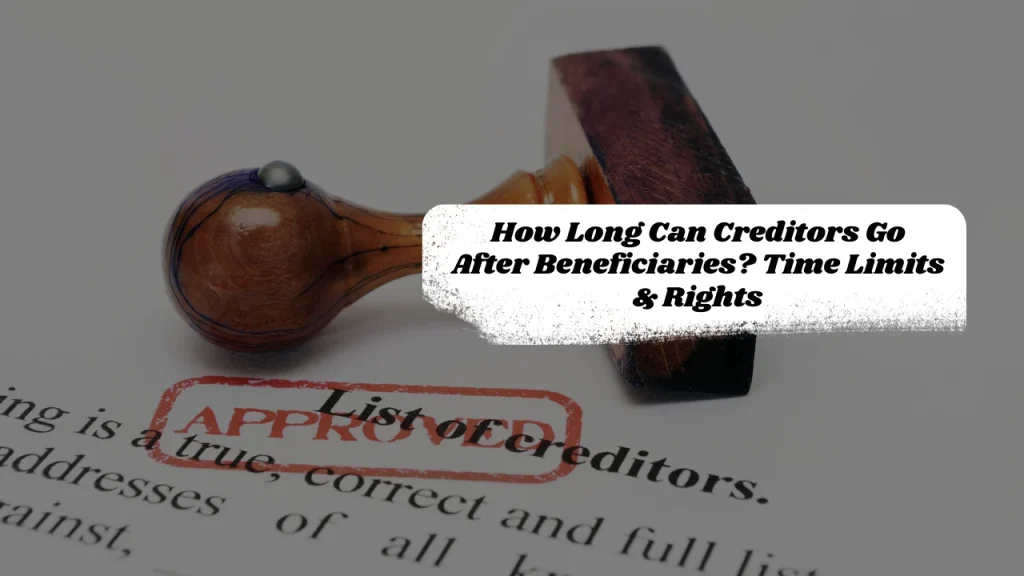How Long Can Creditors Go After Beneficiaries? Time Limits & Rights
When a loved one passes away, their debts don’t simply disappear. Many beneficiaries worry: Can creditors take my inheritance? Creditors have a limited time to file claims against the estate after someone’s death, usually within a few months to a year, depending on state laws. For example, in California, it’s one year from the date of death, but this can be shorter if the executor gives notice.
Once the estate is closed and assets are distributed, beneficiaries are generally not personally liable for the estate’s debts, provided the estate was administered correctly.
Exceptions and Time Limits
However, if the estate was distributed without paying all debts or if there was misconduct, creditors might try to recover from beneficiaries. This is rare and depends on state laws, with time limits typically aligning with the claim filing period. After this, beneficiaries are normally safe from creditor claims.
How Long Do Creditors Have to Make a Claim?
The time limit creditors have to pursue claims against an estate or its beneficiaries varies by state. This period is known as the creditor claim window and typically ranges from a few months to several years.
State-Specific Creditor Claim Periods:
- California: 1 year from the date of death
- Texas: 4 months after notice from executor
- New York: 7 months from the executor’s appointment
- Florida: 2 years from the date of death if no formal notice is given
Can a Creditor Go After Beneficiaries Directly?
In most cases, beneficiaries are not personally liable for a deceased person’s debts. However, there are exceptions:
- If You Co-Signed a Loan – Any co-borrowers remain legally responsible for the debt.
- If the Estate Cannot Cover All Debts – Creditors may expect repayment from assets before distribution to beneficiaries.
- If Fraudulent Transfers Occur – If a person transfers assets before death to avoid paying debts, courts may allow creditors to reverse the transfer.
Related article for you:
How Long Do You Have to File Probate After Death in Massachusetts?

Estate Distribution and Closure
Once all valid creditor claims are paid, the remaining assets are distributed to the beneficiaries as per the will or state intestacy laws. The estate is then closed, and the executor’s responsibilities are generally discharged. At this point, beneficiaries are typically not personally liable for the estate’s debts, as the estate, not the individuals, is responsible for the debts. This is a critical protection for beneficiaries, ensuring they can receive their inheritance without fear of personal liability.
Do Creditors Have Rights to a Trust Inheritance?
Assets placed in a properly structured irrevocable trust are usually safe from creditors, whereas assets in a revocable trust may still be subject to claims until distributed.
How to Protect an Inheritance from Creditors
To shield inherited assets from creditor claims:
- Establish an Irrevocable Trust – This legally separates assets from the deceased’s estate.
- Use a Spendthrift Trust – Prevents beneficiaries from voluntarily or involuntarily giving assets to creditors.
- Understand State Homestead Laws – Some states offer inheritance exemptions for certain types of assets, such as primary residences.
- Consult an Estate Planning Attorney – A professional can help structure inheritance to minimize risks.
What If a Creditor Misses the Deadline?
Once the creditor claim window expires, creditors typically lose the right to collect unpaid debts. However, exceptions may apply, especially if fraud or hidden assets are discovered later.
FAQs
Can credit card companies go after beneficiaries?
No, unless the beneficiary was a co-signer on the account.
How can I check if my inheritance is at risk?
Review the estate’s debt obligations and consult a probate attorney for legal guidance.
Are life insurance payouts subject to creditor claims?
Generally, no—life insurance proceeds go directly to the beneficiary and are protected from estate debts unless the estate is named as the beneficiary.
Read also: Do Bank Account With Beneficiaries Have To Go Through Probate
Final Thoughts
While creditors may have the right to claim estate assets, beneficiaries are rarely liable for a deceased person’s debts. Understanding state-specific laws, utilizing protective legal tools, and consulting an estate attorney can ensure that your inheritance remains secure.
About the Author

Sarah Klein, JD, is an experienced estate planning attorney who has helped clients with wills, trusts, powers of attorney, and probate matters. At All About Lawyer, she simplifies complex estate laws so families can protect their assets, plan ahead, and avoid legal headaches during life’s most sensitive moments.
Read more about Sarah
